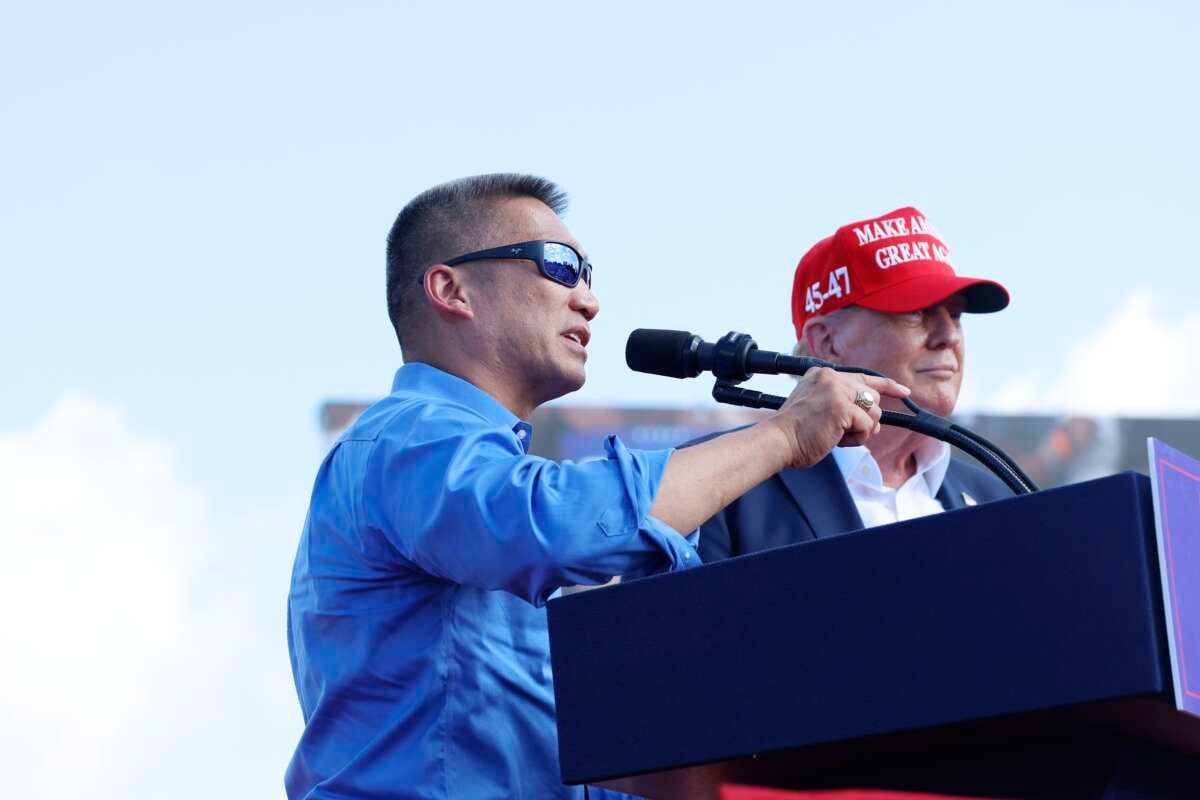Virginia U.S. Senate candidate Hung Cao (R) has defended the U.S.’s capitalist health care model in an interview, baselessly suggesting that no one is worried about dying under the current system — which has been proven, time and again, to be more costly and less effective at covering the general populace than other models employed in wealthy nations across the globe.
Cao, who has run a floundering campaign that even his Republican colleagues have described as poorly managed, made the comments back in May. However, because his candidacy against incumbent Sen. Tim Kaine (D-Virginia) has received so little attention, some news outlets have only now started reporting on them.
Still, Cao’s comments are relevant given that his views line up with those of the broader Republican Party, whose members have repeatedly called for privatizing health care to such an extent that it would endanger pre-existing health protections made possible through the Affordable Care Act (ACA).
During his interview with a little-known conservative streaming outlet, Cao emphasized creating “choices” for people to give them better health care, stating that people who pay more should “get better” services.
“It’s just the way it is,” Cao said. “But no one in the United States is like, ‘oh my gosh, I will die if I don’t have health care.'”
Cao then went on to suggest that undocumented immigrants were somehow taking U.S. citizens’ spots at hospitals, resulting in people who need medical attention being denied care — a racist claim that has no basis in reality whatsoever.
Cao’s assertions that no one is dying from not being able to access health care are entirely false. Indeed, an expansion of health care services, including a Medicare for All model, would save tens of thousands of lives across the U.S. each year.
According to a 2020 study of Medicare for All proposals put forward by Sens. Bernie Sanders (I-Vermont) and Elizabeth Warren (D-Massachusetts), approximately 68,000 American lives would be saved annually if the U.S. shifted to that model. Additionally, a Medicare for All approach would save the average American family $2,400 annually, or the country as a whole about $45 billion in health care costs each year.
“Our study is actually conservative because it doesn’t factor in the lives saved among underinsured Americans — which includes anyone who nominally has insurance but has postponed or foregone care because they couldn’t afford the copays and deductibles,” said Alison Galvani, author of the study and a researcher at the Center for Infectious Disease Modeling and Analysis at the Yale School of Public Health, speaking to Newsweek at the time about the findings.
More recently, Sen. J.D. Vance (R-Ohio), the vice presidential nominee running alongside former President Donald Trump on the GOP ticket for president, suggested a similar “choice” based approach to health care. Vance, in trying to clear up a muddled answer that Trump had given during a debate with Democratic nominee Vice President Kamala Harris, said the former president’s “concepts of a plan” to drastically alter the ACA included creating separate “pools” for people to be included in for health coverage, based on their current health status, to supposedly lower costs.
“We want to make sure everybody is covered. But the best way to do that is to actually promote some more choice in our health care system and not have a one-size-fits-all approach that puts a lot of people into the same insurance pools,” Vance said in September.
While that approach would lessen costs for healthier Americans, those with pre-existing conditions would likely see their costs increase substantially, effectively reigniting previous blockages to coverage for people with those conditions.
“When Vance here says he wants to put the healthy and sick in different risk pools he’s saying he wants to make preexisting conditions protections impossible,” said Brian Beutler, senior editor at The New Republic.
What Vance’s comments mean, said doctor and social media influencer Áine Yore, is that “healthy people get to buy into super cheap insurance [while] sick people get shunted into plans that are unsustainable.”
Angry, shocked, overwhelmed? Take action: Support independent media.
We’ve borne witness to a chaotic first few months in Trump’s presidency.
Over the last months, each executive order has delivered shock and bewilderment — a core part of a strategy to make the right-wing turn feel inevitable and overwhelming. But, as organizer Sandra Avalos implored us to remember in Truthout last November, “Together, we are more powerful than Trump.”
Indeed, the Trump administration is pushing through executive orders, but — as we’ve reported at Truthout — many are in legal limbo and face court challenges from unions and civil rights groups. Efforts to quash anti-racist teaching and DEI programs are stalled by education faculty, staff, and students refusing to comply. And communities across the country are coming together to raise the alarm on ICE raids, inform neighbors of their civil rights, and protect each other in moving shows of solidarity.
It will be a long fight ahead. And as nonprofit movement media, Truthout plans to be there documenting and uplifting resistance.
As we undertake this life-sustaining work, we appeal for your support. Please, if you find value in what we do, join our community of sustainers by making a monthly or one-time gift.
